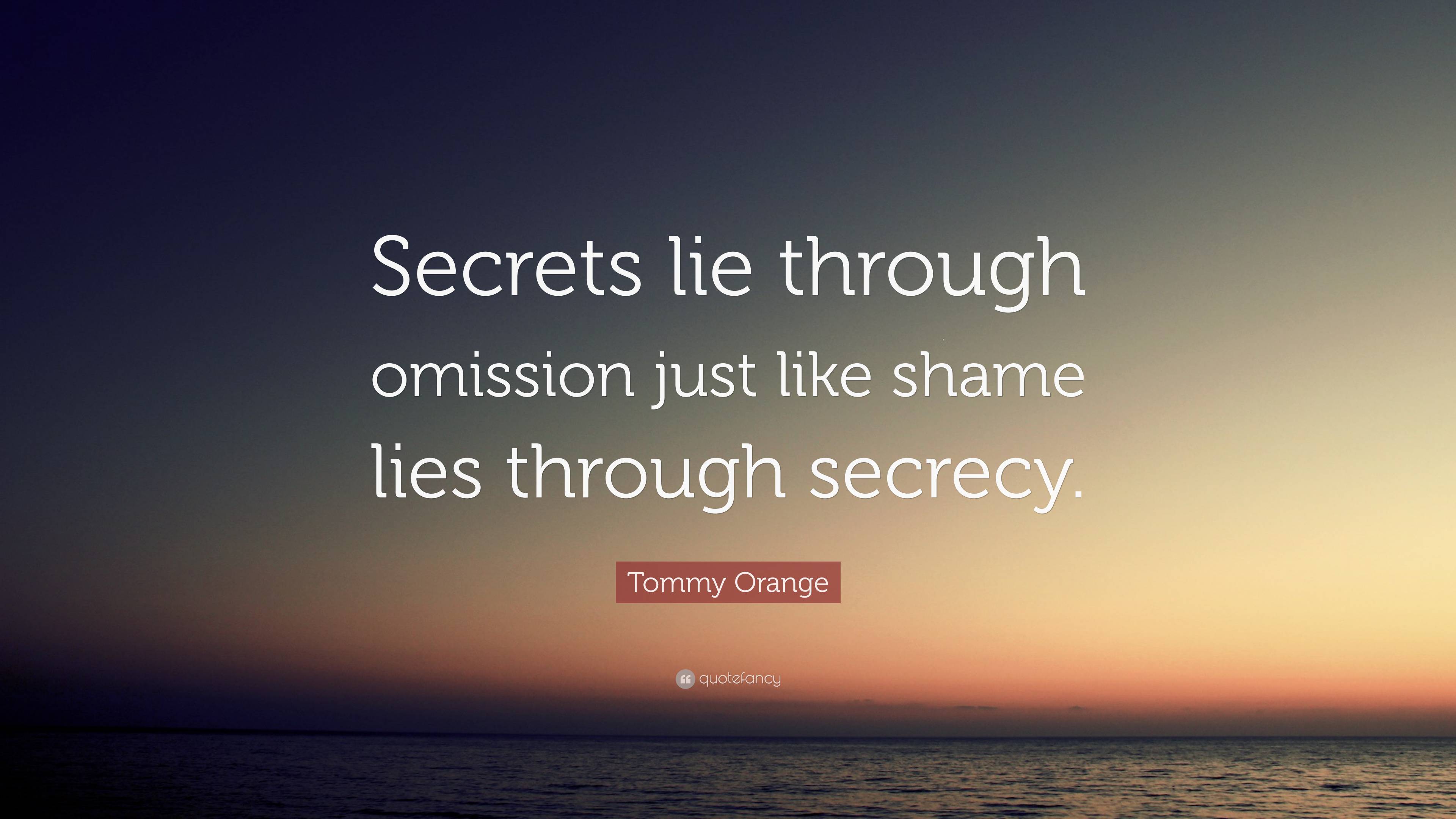Lie Through Omission: The Sneaky Way Truth Gets Twisted
Ever heard of a lie that doesn’t involve outright falsehoods? Yeah, it’s a thing, and it’s called "lie through omission." This sneaky form of deception is everywhere, from politics to everyday conversations. It’s when someone leaves out crucial details to manipulate the truth. And trust me, it’s more common than you think.
Imagine this: your friend tells you they aced their exam, but they fail to mention they only studied the night before. Or how about a politician who talks about economic growth but conveniently skips the part where inequality has skyrocketed? That’s lie through omission in action. It’s not technically a lie, but it’s far from the whole truth.
Now, why does this matter? Well, in a world where information is power, knowing how people twist facts can help you navigate the murky waters of communication. Whether you’re dealing with friends, family, or even strangers online, understanding lie through omission can save you from being misled. So, buckle up because we’re diving deep into this sneaky tactic.
- Allan Kayser A Deep Dive Into The Life And Career Of The Talented Actor
- Jamie Fraser Of Outlander A Journey Through Time And Love
What Exactly is Lie Through Omission?
Lie through omission happens when someone selectively presents information to create a misleading impression. Instead of lying outright, they leave out key details that would change the narrative. Think of it like editing a photo—sure, the image is technically real, but the cropping and filters make it look completely different from reality.
For example, a company might advertise their product as "100% natural," but fail to mention it’s loaded with sugar. Or a resume might highlight years of experience but omit the fact that most of it was unpaid internships. See how it works? It’s all about presenting a partial truth to sway perceptions.
Why Do People Use Lie Through Omission?
Let’s be real—people lie for all kinds of reasons. Sometimes it’s to protect themselves, other times it’s to manipulate others. Lie through omission is no different. Here are a few reasons why folks might choose this sneaky route:
- Vanessa Bryant Weight Loss A Journey To Health And Wellness
- Theo James Workout Achieving The Ultimate Fitness Inspired By The Actor
- Self-Preservation: People might omit details to avoid embarrassment or consequences. Like when someone says they were "running errands" but forgets to mention they were actually at the bar.
- Manipulation: Politicians and marketers love this tactic. By highlighting certain facts and ignoring others, they can steer public opinion in their favor.
- Social Acceptance: Some people stretch the truth to fit in or impress others. Ever heard someone exaggerate their achievements? Chances are, they left out the less glamorous parts.
Is Lie Through Omission Really That Bad?
Here’s the thing: lie through omission might not seem as harmful as outright lying, but it’s still deceptive. When someone withholds crucial information, they’re essentially manipulating the truth. And that can have serious consequences.
In relationships, for instance, withholding details can erode trust. Imagine a partner saying they were "out with friends" but leaving out the part where they kissed someone else. It’s not a direct lie, but it’s far from honest. Over time, these omissions can damage even the strongest bonds.
Examples of Lie Through Omission in Real Life
To truly understand lie through omission, let’s look at some real-world examples. These scenarios might sound familiar because, hey, we’ve all encountered them at some point.
1. In Politics
Politicians are masters of lie through omission. They’ll highlight economic growth numbers but fail to mention rising unemployment rates. Or they’ll tout crime reduction stats while ignoring the fact that the data only covers certain areas. It’s all about presenting a polished image, even if it’s not the full picture.
2. In Advertising
Ever see an ad claiming a product is "clinically proven" without explaining the tiny sample size or questionable methodology? That’s lie through omission in action. Marketers know that most people won’t dig deep into the fine print, so they rely on selective information to sell their products.
3. In Personal Relationships
We’ve all been there—someone asks how your day was, and you say "fine" when really, it was a disaster. Or maybe you tell a friend you’re "happy" in your relationship but leave out the fact that you’re secretly miserable. These little omissions might seem harmless, but they can add up over time.
How to Spot Lie Through Omission
Now that you know what lie through omission looks like, how do you catch it in action? Here are a few red flags to watch out for:
- Incomplete Information: If someone gives you a vague answer or avoids specifics, they might be omitting details.
- Overly Positive Narratives: Be skeptical when someone only highlights the good stuff. Where’s the balance?
- Deflection: If someone changes the subject or avoids answering your question directly, they might be hiding something.
Remember, context is key. Ask follow-up questions and dig deeper to uncover the full story. Trust your gut—if something feels off, it probably is.
How to Avoid Falling for Lie Through Omission
Being aware of lie through omission is the first step, but how do you protect yourself from falling for it? Here are a few tips:
- Do Your Research: Don’t rely on a single source of information. Cross-check facts and look for multiple perspectives.
- Question Everything: Don’t take things at face value. Ask questions and seek clarification when something seems fishy.
- Stay Skeptical: Healthy skepticism is your best friend. Just because someone presents a convincing narrative doesn’t mean it’s the whole truth.
By staying vigilant and critical, you can shield yourself from the sneaky tactics of lie through omission.
The Psychological Impact of Lie Through Omission
Lie through omission doesn’t just affect the person withholding information—it also impacts the person on the receiving end. When someone is misled, it can lead to mistrust, confusion, and even emotional distress.
In relationships, for example, repeated omissions can create a pattern of dishonesty. Over time, this can erode intimacy and lead to feelings of betrayal. In professional settings, it can result in poor decision-making and damaged reputations.
Why People Fall for It
Here’s the kicker: lie through omission works because it exploits our natural tendency to trust others. Most of us assume people are being honest, especially if they’re not outright lying. But in a world where information is curated and filtered, we have to be more cautious.
Legal and Ethical Implications
While lie through omission isn’t always illegal, it can still have serious legal and ethical consequences. In some cases, it can be considered fraud or misrepresentation, especially in business or legal contexts.
For example, if a company withholds crucial information about a product’s safety, they could face lawsuits and hefty fines. Similarly, in legal proceedings, withholding evidence can result in criminal charges. Ethically speaking, lie through omission violates the principles of honesty and transparency, which are essential for building trust.
How to Handle Lie Through Omission
So, what do you do when you catch someone in a lie through omission? Here are a few strategies:
- Confront Gently: If it’s a personal matter, approach the person calmly and ask for clarification. Sometimes people don’t even realize they’re omitting details.
- Present Evidence: If it’s a professional or public issue, present concrete evidence to back up your claims. Facts are powerful tools.
- Set Boundaries: If someone repeatedly uses lie through omission, it might be time to set boundaries or distance yourself from the situation.
Remember, handling lie through omission requires tact and empathy. Sometimes people omit details out of fear or insecurity, so it’s important to approach the situation with understanding.
Conclusion: The Truth About Lie Through Omission
So there you have it—the lowdown on lie through omission. It’s a sneaky tactic that’s all too common in our daily lives, from politics to personal relationships. By understanding how it works and how to spot it, you can protect yourself from being misled.
Here’s the big takeaway: truth matters. Whether it’s the whole truth or just a partial version, being honest—both with yourself and others—is essential for building trust and fostering meaningful connections. So next time someone presents a shiny narrative, take a step back and ask yourself: what’s missing?
And now it’s your turn. Have you ever encountered lie through omission? Share your stories in the comments below. Or better yet, spread the word by sharing this article with your friends. Together, we can create a world where honesty reigns supreme. Trust me, it’s worth it!
Table of Contents
- What Exactly is Lie Through Omission?
- Why Do People Use Lie Through Omission?
- Is Lie Through Omission Really That Bad?
- Examples of Lie Through Omission in Real Life
- How to Spot Lie Through Omission
- How to Avoid Falling for Lie Through Omission
- The Psychological Impact of Lie Through Omission
- Legal and Ethical Implications
- How to Handle Lie Through Omission
- Conclusion: The Truth About Lie Through Omission



Detail Author:
- Name : Otto Hegmann PhD
- Username : kreiger.lionel
- Email : jevon45@yahoo.com
- Birthdate : 1986-03-09
- Address : 488 Sheldon Views Suite 433 New Cristal, FL 28173
- Phone : 959.237.6821
- Company : Kiehn Inc
- Job : Biologist
- Bio : Et voluptatem quis consequatur ut aliquid inventore omnis. Quis laborum eveniet rem labore nisi quasi. Illo id deserunt delectus sint. Quidem dignissimos harum vitae qui quas neque.
Socials
twitter:
- url : https://twitter.com/johnsonc
- username : johnsonc
- bio : Delectus consectetur doloribus nihil nostrum nihil. Voluptatum enim cum et eos veniam molestias et. Saepe eveniet perspiciatis et quis sed.
- followers : 6167
- following : 2118
facebook:
- url : https://facebook.com/johnson1992
- username : johnson1992
- bio : Eius fugiat dolorum voluptas eaque quos.
- followers : 714
- following : 2962